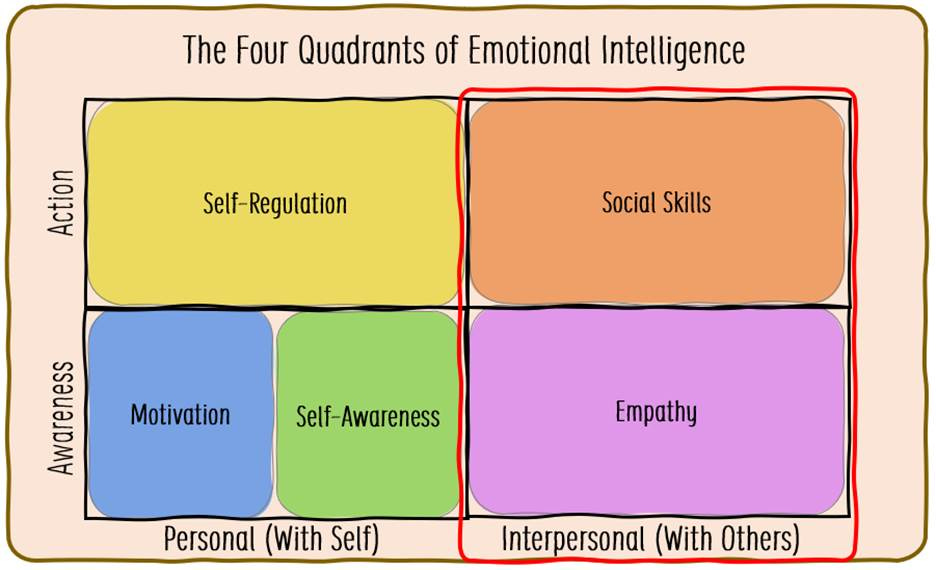The Role of Emotional Intelligence in Project Management
In the world of project management, the focus often leans toward schedules, budgets, and deliverables, however, one aspect that often goes overlooked is Emotional Intelligence (EQ).
EQ is not just a buzzword but a critical skill set for project managers aiming to lead their teams to success.
In this post, we'll delve into the intricacies of emotional intelligence and explore its profound impact on project management.
The Components of Emotional Intelligence
According to psychologist Daniel Goleman, emotional intelligence comprises five key components:
Self-Awareness:
Understanding one's emotions and their impact on others.
Being self-aware entails a comprehensive understanding of your own strengths and shortcomings, it involves the ability to pause and scrutinize your emotional and mental state before taking any action.
This vital element of Emotional Intelligence (EQ) allows you to swiftly comprehend your feelings and their impact on others.
As you continuously hone this indispensable leadership attribute, it becomes second nature. The capability to shape outcomes not only elevates your confidence but also enhances your decision-making skills and your rapport with your team or teams.
1. Stay attuned to your strengths, weaknesses, thoughts, and emotions.
2. Recognize your emotional triggers to better regulate your feelings.
3. Maintain a diary for introspection and to glean insights from your experiences.
4. Contemplate the repercussions of your actions on others.
5. Engage in affirming self-dialogue.
6. Adopt a mindset focused on growth and improvement.
The key takeaway is to remain diligent and monitor your advancement. Don't hesitate to solicit constructive criticism from trusted colleagues or mentors.
Self-Regulation:
Managing disruptive emotions and impulses effectively.
Self-regulation involves the transformation of negative thoughts and emotions into positive ones, along with the ability to pause before reacting emotionally.
Leaders who excel in self-regulation can channel negative emotions productively rather than destructively. This constructive perspective aids in addressing challenges with a level-headed approach.
Mastering self-regulation is crucial for impactful leadership as it enables you to maintain composure and express yourself appropriately in front of your team. As you build resilience, you recover from setbacks more quickly, become more adaptable, and better handle change.
1. Be mindful of your emotional and mental state.
2. Cultivate emotional resilience by accepting your feelings.
3. Acquire coping mechanisms to manage distressing emotions.
4. Frame each new obstacle as a growth opportunity.
5. Recognize that you always have a choice in how you react.
6. Be willing to assume accountability for your actions.
7. Uphold your ethical principles while leading your team.
It's essential to note that self-regulation doesn't imply suppressing your genuine emotions or concealing your true feelings, rather, it's a skill set aimed at helping you articulate yourself more fittingly.
The ultimate aim is to maintain poise and navigate stressful situations with equanimity.
Motivation:
Being driven to achieve goals.
Self-motivation is an indispensable facet of emotional intelligence in leadership; a team is unlikely to perform optimally if the leader lacks intrinsic motivation.
The optimistic manager attitude not only elevates their own performance but alharbouring team morale.
Such leaders are action-focused, continually setting lofty objectives and harbouring an authentic enthusiasm to accomplish them, this means the journey towards improvement is ongoing; there's always a new peak to scale and greater heights to achieve.
1. Establish achievable, quantifiable, and realistic milestones.
2. Inject stimulating challenges to sustain enthusiasm.
3. Commend both small victories and major accomplishments.
4. Innovatively turn hindrances into avenues for growth.
5. Be conscious of your influence as a leader and its ripple effect on your team.
6. Periodically assess your growth trajectory and identify avenues for improvement.
7. Remain receptive to adaptability and change.
To thrive in a leadership role, it's crucial to maintain a positive self-image, even in adverse situations.
View hurdles as temporary setbacks and educational moments rather than as outright failures; keep your objectives clear and attainable, to sustain your motivation, consistently set new targets and welcome fresh challenges.
Empathy:
Understanding the emotions of others.
Contrary to traditional views, empathy is a sign of strength rather than a weakness. It acts both as a skill and a quality that enables leaders to connect deeply with their teams by displaying compassion and understanding.
Begin actively listening to others without cutting them off.
Step into another person's perspective, particularly during conflicts.
Acknowledge and express gratitude towards your team members.
Be willing to disclose your emotions when it's suitable.
Contribute your time to a meaningful endeavor, such as a community initiative.
Engage in practices like loving-kindness meditation or mindfulness techniques.
Hone your nonverbal communication skills and become adept at interpreting those of others.
Engaging with others on a human level fosters mutual respect, which facilitates the peaceful and constructive resolution of workplace conflicts and disagreements.
Social Skills:
Managing relationships to move people in desired directions.
Clear and effective communication is vital for such leaders, as it fosters significant and mutually respectful connections. Here are six additional benefits of mastering social skills in the workplace:
1. Approachable leaders wield more convincing influence.
2. Fosters self-awareness and a deeper understanding of team dynamics.
3. Skilled in managing both conflicts and interpersonal relationships.
4. Elevated sense of social consciousness.
5. Enhanced capacity for guiding and nurturing emerging talent.
6. Highly proficient in fostering collaboration and teamwork.
Why Emotional Intelligence Matters in Project Management
Team Dynamics
A project manager with high emotional intelligence can sense the unspoken issues within the team, address them proactively, and foster a positive work environment.
This leads to higher levels of trust and collaboration, ultimately resulting in better project outcomes.
Decision Making
EQ plays a crucial role in making balanced, informed decisions.
A project manager who is aware of both their emotions and those of their team can make decisions that are not just logical but also empathetic.
Conflict Resolution
Conflicts are inevitable in any project.
A project manager with strong emotional intelligence can mediate disputes effectively, ensuring that the team remains focused on the project objectives.
Case Studies
Common Indicators of Low Emotional Intelligence (EQ)
Observable behaviours often reveal low levels of emotional intelligence.
1. Individuals with low EQ are prone to disproportionate emotional outbursts.
2. Listening to others is often a challenge for those with low EQ.
3. A tendency to engage in confrontations characterizes people with low emotional intelligence.
4. A proclivity for shifting blame onto others is another sign of low EQ.
5. Viewing others as overly sensitive, mainly because the individual lacks emotional understanding, is another indicator.
6. Struggling to maintain friendships or other interpersonal relationships is a common symptom.
7. A reluctance to consider alternative perspectives, also known as stonewalling, is another hallmark of low EQ.
A study conducted in 2002 by Dearborn serves to corroborate Daniel Goleman's pioneering work in emotional intelligence, the research emphasizes the importance of targeted training in emotional intelligence concepts to enhance leadership skills, thereby increasing Return On Investment (ROI).
The study underscores the significance of individual-centric learning approaches for honing emotional intelligence skills; traditional training setups were found to be less effective compared to personalized programs.
Emotional intelligence development is not only a subjective process but is also influenced by the prevailing organizational culture.
Goleman's academic contributions have laid the groundwork for applying emotional intelligence principles within organizational settings. It is crucial to analyze how leaders assimilate and apply the knowledge in their organizations to ensure the success of initiatives. The study revealed that many leaders, despite undergoing training and feeling invigorated, would revert to their old ways upon returning to their organizations.
A more effective ROI was observed when training incorporated individual assessments and future-oriented development plans; when an organization starts to prioritize human interaction and collective effort over mere financial metrics, a natural transformation occurs.
When this organizational vision is shared and adopted by not just the leaders but also the employees, the likelihood of achieving desired outcomes increases significantly.
How to Improve Your EQ for Better Project Management
Improving your emotional intelligence is a lifelong journey. Here are some practical tips to get you started:
Practice Active Listening: Pay close attention to what others are saying without forming your response while they're speaking.
Seek Feedback: Regularly ask for feedback to understand how your actions and decisions affect those around you.
Mindfulness: Engage in mindfulness practices to improve your self-awareness and control over your emotions.
How to improve emotional intelligence in project management and inside the team
Feedback:
Provide constructive feedback to peers and be open to receiving the same.
Team Building Activities:
Regular team-building exercises can help improve interpersonal relationships and thus, emotional intelligence.
Open Forums:
Create a safe space where team members can express their feelings and concerns openly.
Professional Development:
Offer resources or workshops focused on developing emotional intelligence skills.
Books to Read:
Goleman: Emotional Intelligence: Why it Can Matter More Than IQ
Roger: Emotional Intelligence 2.0: How to Get Rid of Negative Thoughts





